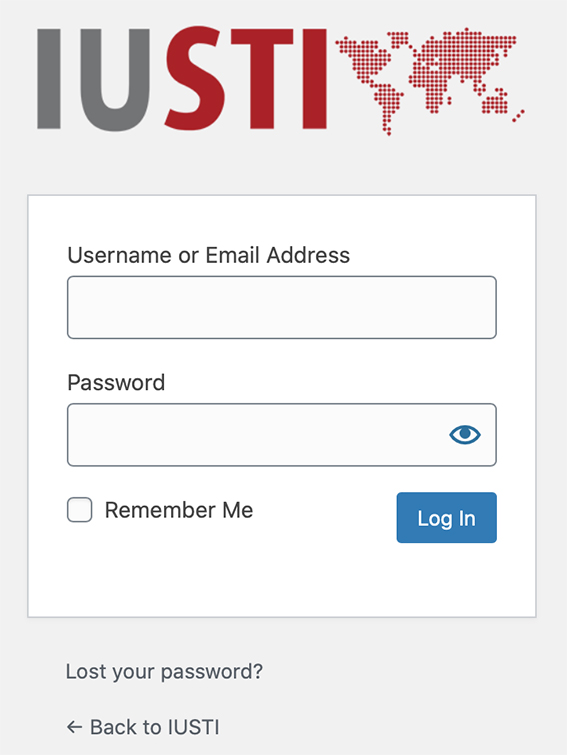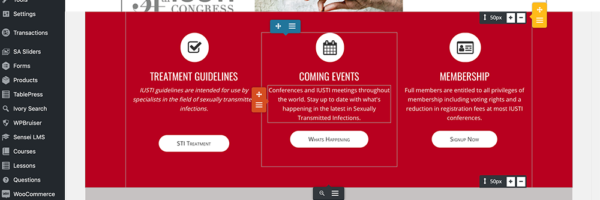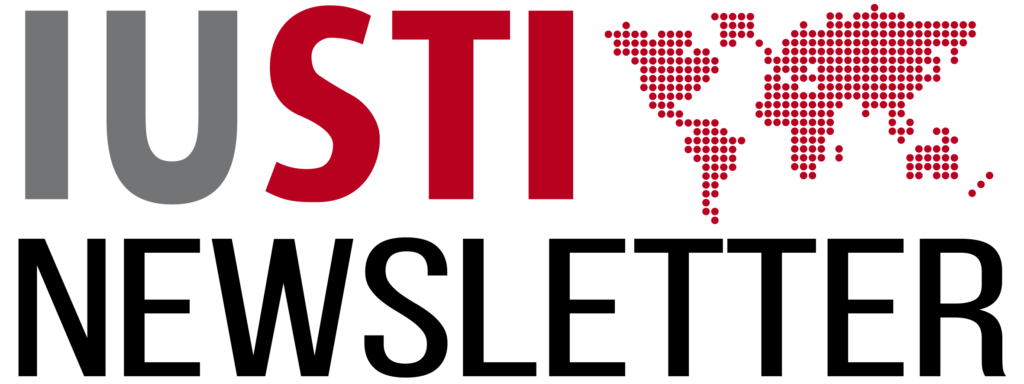Director’s Report from the IUSTI European Regional
(July 2013- September, 2014)
IUSTI World Congress 2013
The incontestable highlight in the world of IUSTI in 2013 was the IUSTI/ISSTDR Congress in Vienna from 14 to 17 July. In line with a general policy adopted by the Council of IUSTI-Europe, we do not organise a European congress in years when a world congress is held in Europe.
The IUSTI/ISSTDR Congress in Vienna was a highly impressive event as regards both its scientific and social programmes. By their extraordinary – and successful – efforts in organising it, Prof Angelika Stary and Dr Claudia Heller have surely earned a permanent place of honour in the IUSTI annals.
Council meeting of IUSTI – Europe 2013
During the IUSTI World Congress, also a Council meeting of IUSTI-Europe was held. This time in accord with our Rules and Regulations, the possibility of continuing under the expert and enthusiastic leadership of Dr Keith Radcliff had come to an end.
Over the years, Dr Keith Radcliff has spared no effort to advance the organisation. Dr Keith Radcliffe was officer of IUSTI-Europe for 12 years. He was Chair of the Scientific Board from 2001 to 2005 and Regional Director from 2005 to 2013. In the latter capacity, among other remarkable achievements, he made an invaluable contribution to establishing the IUSTI-Europe branch as a non-profit organisation, thus giving it a legal status for the first time in its history. In particular, he is the author of both the Articles of Association and the Rules and Regulations of the organisation.
Dr Radcliffe has also been Editor-in-Chief of the European STI Guidelines Project since 1998. IUSTI-Europe is extremely happy that Dr Radcliffe will continue in this role.
The Board of IUSTI-World elected Dr Airi Põder as new Regional Director. The Council of IUSTI Europe elected Dr Claudia Heller as new Chair of the Council.
From January 2013 IUSTI-Europe created a new post : the Membership Secretary. This position is currently held by Dr Jackie Sherrard. Dr Jackie Sherrard has made extraordinary efforts in creating a data-base of the members of IUSTI-Europe and in recruiting new members.
IUSTI Europe annual congresses in the following next three years.
- The Congress of IUSTI-Europe in Malta will be held 17-20 September, 2014. The President of the Congress will be Dr Joe Pae, the Chair of the Scientific Board – Dr Jackie Sherrard.
- The Congress of IUSTI-Europe will be held in Barcelona, 24-26 September, 2015. The President of the Congress will be Dr Marti Vall Mayans, the Chair of the Scientific Board – Dr Keith Radcliffe.
- The Congress of IUSTI-Europe will be held in Budapest, 15-17 September, 2016
The President of the Congress will be Dr. Viktória Várkonyi
Changes of the structure of the Council of IUSTI Europe
Starting right after meeting in Vienna IUSTI Europe have carried out a review in order to make the organization stronger and to improve the work of its management.
During all these years IUSTI-Europe has undergone an impressive development and now requires far more day-to-day work to keep going ahead successfully. To arrange this work in an optimal way, we understood that there is an urgent need for looking for new approaches to the management of the organization.
Having pondered thoroughly on the question of how to enhance the efficacy of the management of IUSTI-Europe, we came to the idea that the best we could do now is to involve more people into the active sharing of the responsibility for the smooth functioning of our organization.
To achieve this aim IUSTI Europe have decided to change the Rules and Regulations of IUSTI Europe and to extend the number of IUSTI- Europe officers.
In the new version of the Rules and Regulations of IUSTI Europe there are four new positions:
- The Editor-in-Chief of the European STI Guidelines
- The Secretary General
- A Vice-Chair of International Development
- A Vice-Chair of Scientific Policy
In case of the first two positions we essentially just formalised the status quo.
Keith Radcliffe has been an excellent Editor-in-Chief of the European STI Guidelines and we are delighted that the national representatives understood the importance of this work and agreed that the Editor of European STI Guidelines should be a full member of the group of IUSTI officers.
The post of Secretary General combines two posts: that of the present Secretary and the recently added post of Membership Secretary. With her efficiency and dedication, Jackie Sherrard has proved that she will be perfectly capable of handling the additional tasks involved in the new, combined, post.
Vice-Chair of International Development and Vice-Chair of Scientific Policy are new posts for which we opened the procedure of nomination.
Vice-Chair of International Development
It is very important for IUSTI that this officer represents the interests of IUSTI-Europe in European scientific organisations related to our specialty, such as EADV and EAAD. The officer should be member of these organisations, preferably a member of their boards, and should have participated and would continue to participate actively in EAAD and all EADV conferences (EADV, EADV-Spring, EADV-Winter). The post also presupposes keeping close ties with the branches of IUSTI-Europe and providing advice and assistance to new countries that wish to establish their own IUSTI-Europe branches.
The national representatives have nominated Mikhail Skerlev for this position.
Vice-Chair of Scientific Policy
The primary duty of this officer is to participate consistently in the work of the Scientific Committees of the Conferences of IUSTI-Europe – i.e., to serve as a link and a bearer of continuity between the Scientific Committees of different IUST-Europe conferences. Also, this officer should create a database of the presenters and presentations of our conferences. The aim is to ensure an innovative approach in our organisation as regards the choice and treatment of topics, particularly with a view to preventing repetitiveness in the topics and presentations at consecutive conferences.
All the changes in Rules and Regulations will be discussed and voted on at our next Council meeting and confirmed at the General Assembly during our next IUSTI Europe Conference in Malta.
European STI Guidelines Project
The work of the European STI Guidelines Project continues. The following guidelines are currently being updated: balanoposthitis ; sexually acquired reactive arthritis; syphilis; HIV testing; non-gonoccocal urethritis; genital herpes; chlamydia.
In addition, two new guidelines are in the process of development: a guideline on partner management is nearing completion and work has commenced on producing a new guideline on the management of genital mycoplasmas. As each guideline is updated or developed patient information is being produced about that condition.
The guideline on lymphogranuloma venereum has been updated and posted on the website; it has also been accepted for publication by the Journal of the European Academy of Dermatology and Venereology.
The guidelines can be accessed at www.iusti.org/regions/Europe/euroguidelines.htm and the patient information at www.iusti.org/regions/Europe/PatientInformation.htm
Any comments or suggestions on the work of the European STI Guidelines Project would be gladly received by the Editor-in-Chief, Dr Keith Radcliffe (email: k.radcliffe@virgin.net).
Eastern European Network for Sexual and Reproductive Health
The task of the EE SRH Network mainly includes implementation of guidelines for the laboratory diagnosis and treatment of STIs as well as the optimisation and standardisation of the existing surveillance systems. For the first time in many countries, the monitoring of the antimicrobial resistance of gonococci has been established. The implementation of the treatment guidelines (elaborated by IUSTI) is conducted in tight collaboration with the leading experts of IUSTI.
Eastern Europe and its health care systems are experiencing significant change. Modern technologies, sophisticated assays, and diagnostic strategies are being introduced. Therefore collaboration with countries with well functioning health care structures are crucial. Adoption of internationally acknowledged, evidence-based standards and technologies will allow countries improvement of local medical care standards. Since its formation, the Eastern European Sexual and Reproductive Health (EE SRH) Network has been effective in facilitating this process.
Acknowledgements
This project is supported by grants from the SIDA, and Swedish institute, Stockholm, Sweden.
EE SRH Study Group have had meetings in Uppsala in January and March to improve the
quality assurance of laboratories detecting STI-s in Eastern European countries .
EE SRH Study Group together with IUSTI Estionia had organized 2 Microscopy Courses in Estonia in March and in May.
Marius Domeika has done marvellous work to establish the EE SRH Network and coordinating its work.
Other IUSTI related STI activities in Europe
11th Congress of the Baltic Association of Dermatovenereology
The 11th Congress of BADV (yearly organized meetings taking place in one of the Baltic Republics) was hosted by Kaunas University Department of Dermatovenereology (Chair, Prof Skaidra Valiukeviciene), in Lithuania in October 17-19, 2013.
The present meeting, in contrast from the number of the previous meetings, had devoted many hours for the management of sexually transmitted infections. This became possible due to the tight collaboration between the organizers of the BADV Congress and the Eastern European Network for Sexual and Reproductive Health.
IUSTI Courses in Russia
In November 2013 IUSTI Russia organized 2 STI Courses in Moscow and St. Petersburg
For Russian gynacologists .
M.Gomberg has given many lectures in different parts of Russia to introduce the IUSTI STD Management Guidelines.
IUSTI Symposium during the Congress of Russian Dermatovenerology Congress
In March 2014 the Russian Dermatovenerology Congress took place in Moscow. Many IUSTI-Europe council members had been invited to this IUSTI Symposium – organized by IUSTI Russia – to make the presentations.
EADV Spring Meeting in Belgrade
In the 12 th EADV Spring meeting which took place in Belgrade in May, 22 -24,
in contrast from many previous EADV conferences, a big attention was given to STI-s:
9 symposium/ workshops about STI-s were organized during this conference.
About half of IUSTI Europe Council members had been asked to make the presentations in this EADV conference.
16th Conference of IUSTI Estonia
In May,30 -31 the 16 th Conference of IUSTI Estonia took place in Aegviidu.
The number of participants were 130 (103 from Estonia and 27 from different European countries).
Permanent Training Course on STI :
DIAGNOSTIC PATHWAYS AND MANAGEMENT OF
SEXUALLY TRANSMITTED INFECTIONS (EXCLUDING HIV)
In June,6 -8 the training course on STI-s took place in Bertinoro, Italy
The course was organised by the Work Group on Sexually Transmitted Infections of the Italian Society of Clinical Microbiology in cooperation with the Italian Society for STI,IUSTI and WHO
The number of participants were 67 (57 from Italy and 10 from different European countries)




